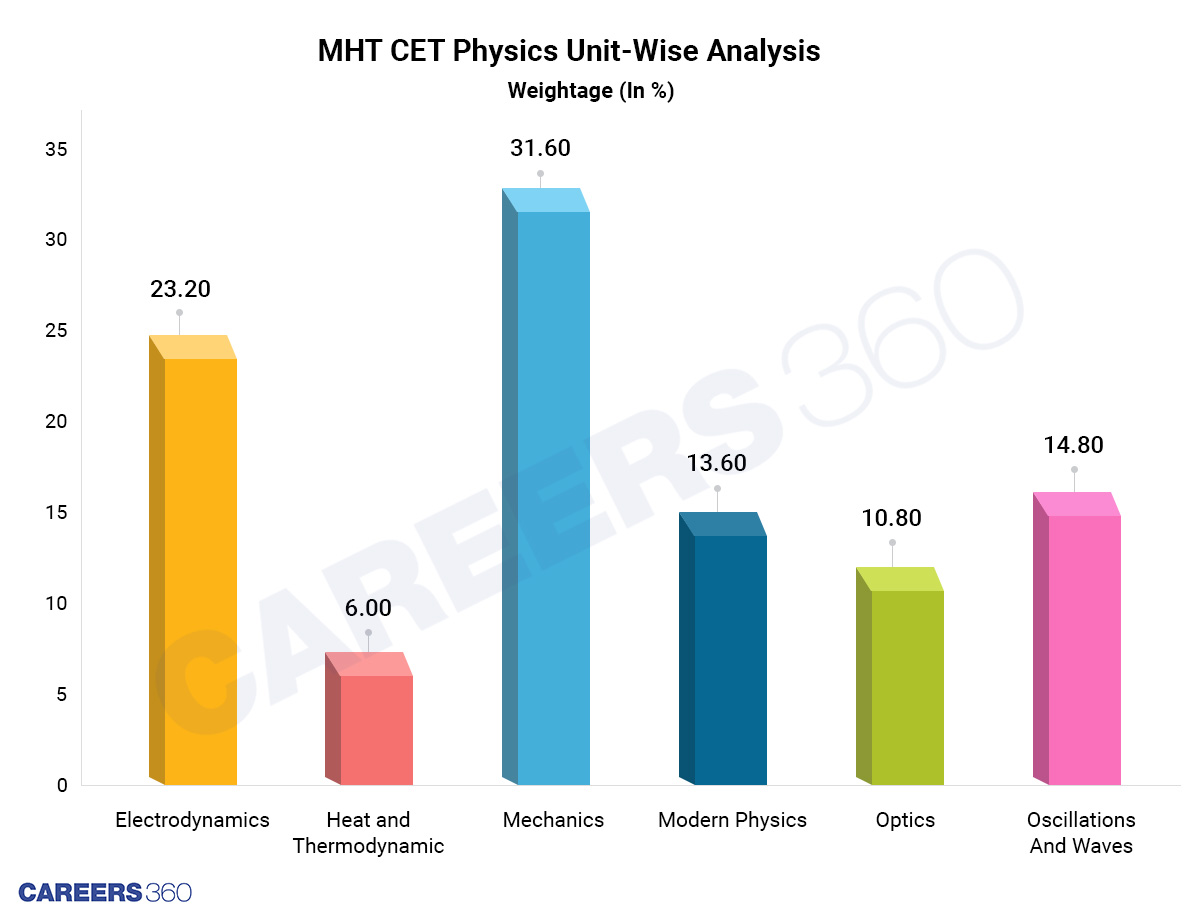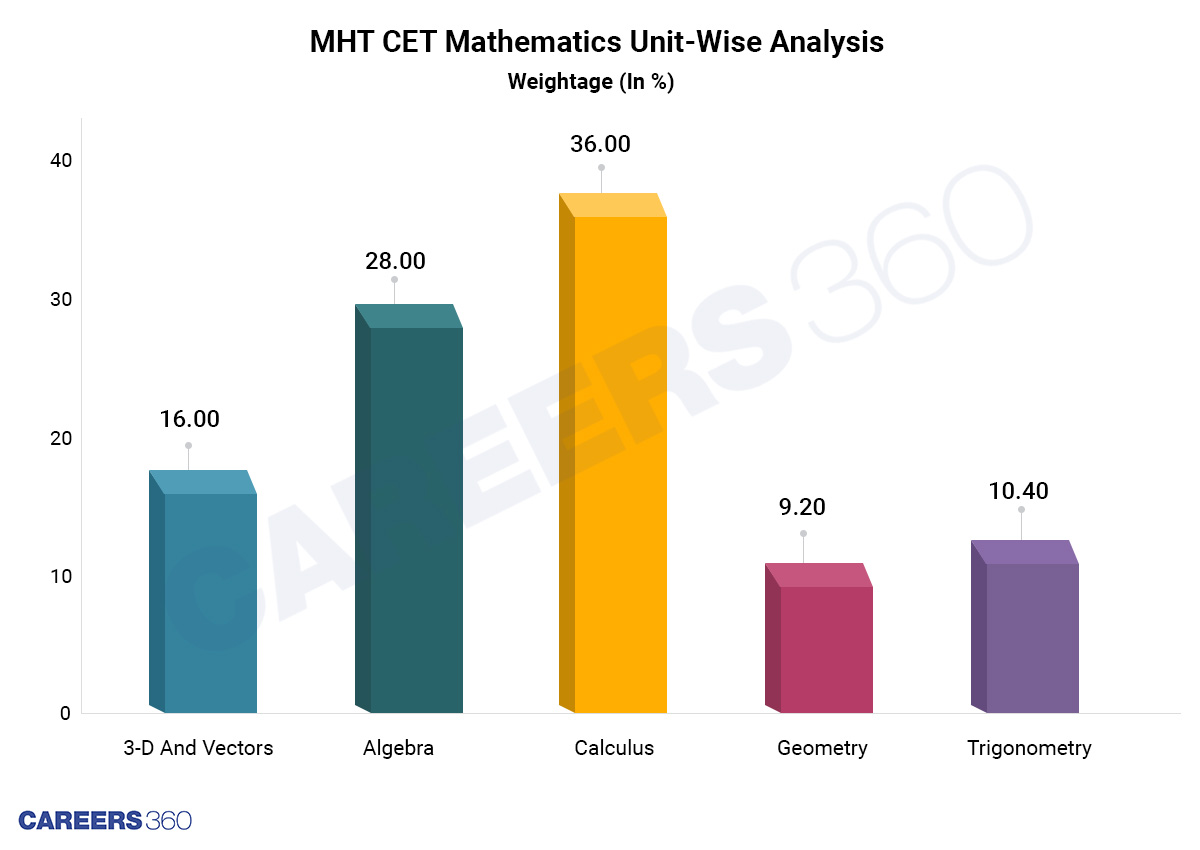MHT CET Question Paper Analysis: Chapters, Topics You Should Study The Most
The Maharashtra Common Entrance Test, or MHT CET, is an entrance test used to select students for admission to undergraduate Engineering and Pharmacy programmes in Maharashtra's colleges. The Maharashtra State Common Entrance Test Cell conducts the test every year and around 400 colleges accept MHT CET results for admission to BTech, BPharma. Candidates from Maharashtra as well as other Indian states are eligible to take the exam which is also known as “MAH CET” or “MahaCET” colloquially.

MHT CET Previous Year’s Question Papers
Practising on previous year’s question papers of exams gives the student a head start. It helps the students understand the structure and minor details of the exam which, in turn, helps students score more. Plus, questions are often repeated and familiarity with questions asked before helps as well.
Knowing the weightage assigned to different sections of the exam or different topics in a subject of different sectors of the exam helps students focus on topics that are important from the exam point-of-view.
MHT CET Syllabus: Class-Wise Weightage
A total of 750 questions were analysed from the past five years which included 50 questions each from Mathematics, Physics and Chemistry . For Physics and Chemistry, 1 mark is awarded for every correct answer and for Mathematics 2 marks will be awarded for every correct answer. There is no negative marking in any section, meaning no marks will be deducted from the total for getting an answer wrong.
Also Read,
PHYSICS
From the table below we can conclude that Mechanics has greater weightage than any of the other sections of Physics. While this implies that a large number of chapters need to be covered, the initial chapters of Mechanics in NCERT Physics textbooks are easier and there are many questions from those.

The table below shows the number of questions asked from each of the topics in MAH CET over the last five years, indicating each chapter's relevance. Among the many chapters covered, the most questions came from Wave Optics and Mechanical Properties of Solids and Fluids – 36 questions – in the last five years. In the Class 12 Physics syllabus, Electricity and Magnetism are most important. These are formula-based, easy to cover and score good marks in.
MHT CET Physics Questions By Chapter
Chapter Name | Class | No. Of Questions |
Alternating Current | 12 | 7 |
Atoms | 12 | 8 |
Communication Systems | 12 | 3 |
Current Electricity | 12 | 15 |
Dual Nature Of Radiation And Matter | 12 | 12 |
Electric Charges And Fields | 12 | 1 |
Electromagnetic Induction | 12 | 6 |
Electromagnetic Waves | 12 | 2 |
Electrostatic Potential And Capacitance | 12 | 8 |
Gravitation | 11 | 10 |
Kinetic Theory | 11 | 4 |
Laws Of Motion | 11 | 3 |
Magnetism And Matter | 12 | 5 |
Mechanical Properties Of Fluids | 11 | 16 |
Mechanical Properties Of Solids | 11 | 8 |
Motion In A Plane | 11 | 8 |
Motion In A Straight Line | 11 | 3 |
Moving Charges And Magnetism | 12 | 14 |
Nuclei | 12 | 2 |
Oscillations | 11 | 18 |
Ray Optics And Optical Instruments | 12 | 9 |
Semiconductor Electronics: Materials, Devices And Simple Circuits | 12 | 9 |
System Of Particles And Rotational Motion | 11 | 15 |
Thermal Properties Of Matter | 11 | 6 |
Thermodynamics | 11 | 5 |
Units And Measurement | 11 | 6 |
Wave Optics | 12 | 18 |
Waves | 11 | 19 |
Work, Energy And Power | 11 | 10 |
CHEMISTRY
The weighting of each branch of Chemistry – Physical, Organic, and Inorganic – Chemistry is shown in the table below. Although all three are vital, study of the MHT CET question paper pattern shows that Organic and Physical Chemistry hold more weight. Nevertheless, students who do well with Mathematics and struggle to remember details, should focus on Physical Chemistry. While Inorganic Chemistry may require more memorisation, questions from it take far less time to answer.
.jpg)
A large number of questions are asked from Class 12 Physical Chemistry from the chapter The P-Block Elements. P block and General Principles and Processes of Isolation of Elements which is commonly known as Metallurgy are an important part of the MHT CET’s Inorganic Chemistry section, together accounting for 31 questions over the past five years. Other important chapters to focus on are Thermodynamics , Equilibrium and Coordination Compounds
MHT CET Chemistry Questions By Chapter
Chapter Name | Class | No. Of Questions |
Alcohols, Phenols And Ethers | 12 | 8 |
Aldehydes, Ketones And Carboxylic Acids | 12 | 16 |
Amines | 12 | 9 |
Biomolecules | 12 | 9 |
Chemical Bonding And Molecular Structure | 11 | 9 |
Chemical Kinetics | 12 | 10 |
Chemistry In Everyday Life | 12 | 12 |
Classification Of Elements And Periodicity In Properties | 11 | 2 |
Coordination Compounds | 12 | 10 |
Electrochemistry | 12 | 15 |
Environmental Chemistry | 11 | 1 |
General Principles And Processes Of Isolation Of Elements | 12 | 10 |
Haloalkanes And Haloarenes | 12 | 6 |
Hydrocarbons | 11 | 9 |
Hydrogen | 11 | 1 |
Organic Chemistry- Some Basic Principles And Techniques | 11 | 11 |
Polymers | 12 | 13 |
Redox Reaction | 11 | 7 |
Solutions | 12 | 18 |
Some Basic Concepts Of Chemistry | 11 | 5 |
States Of Matter | 11 | 4 |
Surface Chemistry | 12 | 3 |
The D And F Block Elements | 12 | 10 |
The P-Block Elements | 11 | 21 |
The S-Block Elements | 11 | 6 |
The Solid State | 12 | 7 |
Thermodynamics | 11 | 18 |
MATHEMATICS
The relative weightage assigned to each part of Mathematics – Algebra, Calculus, Geometry, 3D and Vectors – is shown in the table below. Algebra and Calculus are the most significant sections of Mathematics, accounting for 64 percent of the total questions.

A large number of questions are asked from Calculus, from chapters such as Integrals and Their Application and Differential Equation. A total of 52 questions were asked from these two chapters over the past five years. Probability also has a large weightage, accounting for 22 questions. Some other important chapters are Three Dimensional Geometry, Trigonometric Functions, Application of Derivatives and Mathematical Reasoning but questions from these are usually easy.
MHT CET Mathematics Questions By Chapter
Topic | Class | Number of Questions |
Application Of Derivatives | 12 | 15 |
Application Of Integrals | 12 | 6 |
Complex Numbers And Quadratic Equations | 11 | 2 |
Conic Section | 11 | 6 |
Continuity And Differentiability | 12 | 13 |
Determinants | 12 | 2 |
Differential Equations | 12 | 18 |
Integrals | 12 | 28 |
Inverse Trigonometric Functions | 12 | 7 |
Limits And Derivatives | 11 | 10 |
Linear Programming | 12 | 9 |
Mathematical Reasoning | 11 | 15 |
Matrices | 12 | 10 |
Permutations And Combinations | 11 | 1 |
Probability | 11 | 22 |
Relations And Functions | 11 | 3 |
Sequences And Series | 11 | 6 |
Sets | 11 | 2 |
Straight Lines | 11 | 17 |
Three Dimensional Geometry | 12 | 28 |
Trigonometric Functions | 11 | 19 |
Vector Algebra | 12 | 12 |
MHT CET: How To Prepare
Instead of focusing on single chapters, students should focus on entire units like Calculus, Mechanics, Inorganic Chemistry . Focusing on a unit will help the student score more as each chapter in a unit is well connected to others. However, some of the stand-alone chapters are also important. Questions from them are usually direct because at this level, the topics are not connected to others in the syllabus. These include the Probability, Physical Chemistry chapters.
Preparation tips for MHT CET
- Waves and Oscillations should be prepared thoroughly as these account for many questions but aren’t related to other topics.
- Formulae should be revised again and again as most of the questions asked in Physics are formula-based. Preparation tips for
- Chemistry is all about learning the concepts as a large amount of question are directly from the NCERT Chemistry textbooks.
- Physical Chemistry chapters should be done first as they are easy and are not related to other chapters. Preparation tips for
- In Geometry, Conic Section and Straight Line are absolutely critical for MHT CET. Questions related to them should be practised.
- Mathematics is all about practising different types of questions.
Popular Courses and Specializations
List of colleges accepting MHT CET
Questions related to B.Tech
On Question asked by student community
Hello student pastor Satish
For OBC candidate student in Maharashtra get imbursement of all compulsory fees declared by the government of Maharashtra in favour of the OBC candidates to allow them for higher studies from eleventh level to PHD program. The eligibility criteria for getting this reimbursement of all compulsory
Hello aspirant,
Congratulations for getting such a pretty marks in MH CET 2020. As you are not mentioned any category so I am answering according to general category. As your marks are very good so as per last some years data your rank should be in between 200 to 300
